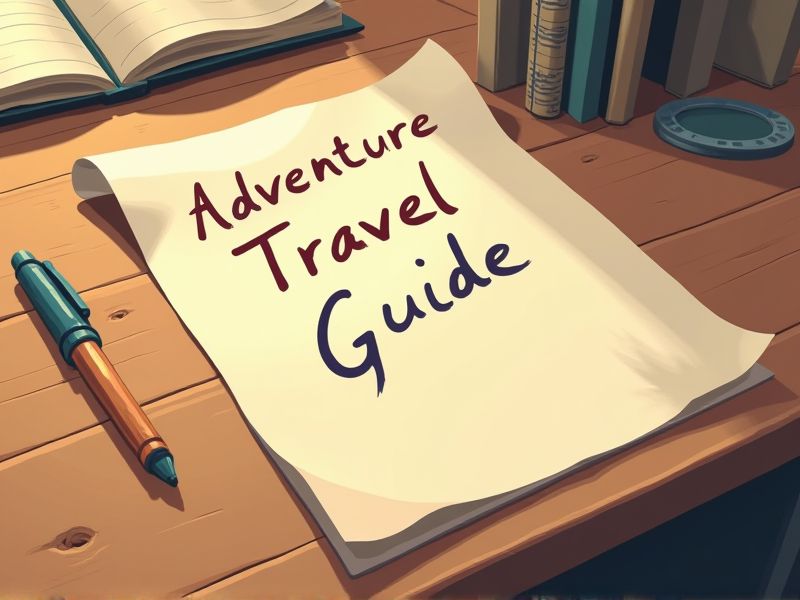
Adventure travel guides operate in environments that demand specialized skills to ensure both safety and enriching experiences. Certifications validate a guide's ability to navigate complex terrain and manage unpredictable scenarios, addressing potential risks. These credentials build trust among clients who seek assurance of qualified guidance during their adventurous pursuits. Here are some important certifications you may need for a career as an Adventure Travel Guide.
Wilderness First Aid Certification
Adventure travel guides often lead groups into remote areas where medical facilities are not readily accessible, increasing the need for on-the-spot medical decision-making. A Wilderness First Aid Certification equips guides with the knowledge and skills necessary to assess and manage medical emergencies in isolated environments. Such certification also instills confidence in clients, knowing their guide is prepared for unexpected incidents. Lack of proper training can result in severe outcomes, including exacerbated injuries and even legal consequences for negligence.
CPR and Basic Life Support Certification
Adventure travel guides often encounter unpredictable environments, increasing the likelihood of accidents or medical emergencies. Possessing CPR and Basic Life Support Certification equips them with essential skills to quickly respond when a participant suffers from cardiac arrest or other critical incidents. This certification boosts the confidence of travelers, knowing they are in the hands of a prepared professional. Guides with emergency response skills can significantly improve survival rates and outcomes in remote areas where immediate medical help is not accessible.
Avalanche Safety Certification
Adventure travel guides often lead groups into unpredictable, snow-covered environments. Without avalanche safety certification, the risk of harm due to insufficient knowledge of avalanche dynamics increases significantly. Certification ensures guides are equipped to make informed decisions on terrain assessment and emergency response. This preparedness not only protects the guides but also increases the safety of the travelers they accompany.
SCUBA Diving Certification (PADI Open Water Diver)
Adventure travel guides often lead groups in diverse underwater environments, so a SCUBA Diving Certification ensures they have fundamental diving skills and safety knowledge. This certification provides them the competency to handle unexpected underwater challenges, thus enhancing group safety. Familiarity with SCUBA diving allows guides to offer enriched, comprehensive experiences for clients interested in marine adventures. Certified guides can also work seamlessly with local dive operators, ensuring legal and operational compliance in various locations.
Rock Climbing Instructor Certification
Obtaining a Rock Climbing Instructor Certification ensures that an adventure travel guide possesses the necessary skills for teaching and managing climbing safely. This certification provides the guide with comprehensive knowledge on risk assessment and emergency response, crucial for outdoor adventure settings. Clients feel more secure and confident when guided by a certified instructor, enhancing their overall travel experience. Certification also often complies with legal and insurance requirements, protecting both the guide and their clients.
Outdoor Leadership Certification
Obtaining an Outdoor Leadership Certification equips an adventure travel guide with vital skills in risk management, ensuring group safety during excursions. The certification also instills environmental ethics, promoting sustainable tourism practices. It increases credibility with clients who seek trustworthy and knowledgeable guides for unpredictable outdoor scenarios. Certified guides are better prepared to handle emergencies, thereby enhancing the overall trust and reputation of their tour operations.
Backpacking and Navigation Certification
The demand for a Backpacking and Navigation Certification is due to the essential skills it provides, ensuring guides can safely lead travelers through challenging terrains. Inadequate navigation skills increase the likelihood of getting lost, which could jeopardize the safety of the entire group. Certified guides demonstrate credibility and competence, factors that build trust with potential clients. Certification programs often cover emergency response training, equipping guides to handle unexpected situations effectively.
Whitewater Rescue Training Certification
Adventure travel guides often lead tours in areas with unpredictable water conditions, and proper training ensures they can respond effectively to emergencies. Without Whitewater Rescue Training Certification, guides may lack the skills to safely manage situations like strong currents or capsizing, increasing risks for both themselves and their clients. Certified guides are more adept at recognizing potential hazards, leading to enhanced safety and client confidence. Training equips guides with life-saving techniques such as swiftwater swimming and rescue rope usage, which are crucial in emergencies.
Leave No Trace Trainer Certification
Adventure travel guides face increasing pressure to minimize environmental impact, and Leave No Trace Trainer Certification equips them with essential skills to achieve this. Understanding Leave No Trace principles enhances a guide's ability to educate travelers on sustainable outdoor practices. Certification ensures guides meet industry standards for eco-friendly tourism, which in turn can attract environmentally-conscious clients. In a sector where responsible travel is a growing trend, certified guides can gain a competitive advantage.
Emergency Response and Survival Skills Certification
Having Emergency Response and Survival Skills Certification equips adventure travel guides with essential knowledge to handle unforeseen accidents, thereby increasing traveler safety. Guides with this certification can make informed decisions under pressure, potentially reducing injuries and fatalities in remote areas. This certification enhances the guide's credibility, leading to increased trust from clients seeking adventurous experiences. It can result in better preparedness for natural disasters or sudden health issues during travels, ensuring smoother operations.
Summary
You gain increased trust and credibility when the Adventure Travel Guide obtains certifications. This validation leads to greater confidence in your decision to book services, anticipating higher standards of safety and professionalism. The guide's enhanced reputation attracts more bookings, resulting in a potential increase in revenue. Quality of experiences improves due to adherence to industry standards, benefiting your overall travel experience.
